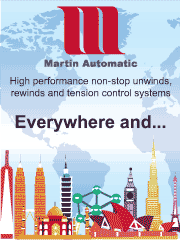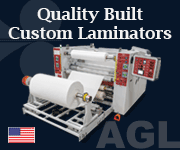Used machinery can bring new life to your operation
- Published: October 01, 1995
If it's handled with caution, a purchase of used equipment can save converters both time and money, and you won't experience buyer's regret.
Anyone who has ever bought a used car knows that you usually get what you pay for - or less. That tomato-red beauty that looks so good in the dealer's lot might just turn into a lemon after you get it home.
So, why would anyone take the chance of paying as much as $1 million on a used piece of converting equipment that doesn't even carry a warranty? Largely, say used equipment dealers, because they don't make the mistake of comparing used machinery, to used cars.
"One of the big myths is that people sell a used piece of equipment to get rid of a problem," says Bob Rodemich, president of International Machinery Inc., Alpharetta, GA. In reality, he suggests, most used equipment goes on the market because a company goes out of business or upgrades to a faster, better, newer model.
"Quite frankly, I think it might be one of the most misunderstood aspects of the business," Rodemich says. "There are more myths that surround the used equipment business [than any other aspect of the converting industry]. Consequently, some people are reluctant to get involved. But, as with most businesses, I think the vast majority of folks in this business are reputable."
By working with a reliable used machinery broker or dealer - and field-testing a piece of equipment before a contract is signed - many converters save thousands of dollars and slash delivery times by tapping into the vast used equipment market.
A Range of Dealers
Dealers of used equipment range from those who primarily broker the sale of machinery between seller and buyer to those who mainly sell equipment that they have bought and refurbished. Some used equipment is sold directly by the owner, but most is handled by brokers or dealers who have a sometimes vast catalog of equipment ready for purchase.
Manier Dar, president of Dars Graphics Arts & Converting Equipment, Neenah, WI, reports that he owns "99.9%" of the equipment that he sells but says that's the exception to the rule. The majority of used equipment dealers, he says, are more like real estate agents, who simply sell property owned by others. While this may not be a bad thing, less qualified brokers tend to know less about the equipment they're selling and consequently are less able to help customers make a qualified purchase.
Others, however, say their customers benefit from the wider range of equipment available from dealers who list but do not own the equipment they sell. For example, a broker may be able to offer a potential buyer a choice among dozens of slitters or printing presses without being limited by the number of machines he can personally afford to have on hand.
Walter Dean is vice president of Milthorp U.S.A., Norcross, GA, a broker and rebuilder of used equipment. He explains that the number of used equipment brokers has grown in recent years as continual downsizing has put more knowledgeable salesmen back on the street. While it may be too costly for them to start their own converting operation, many can easily make the transition to used equipment sales.
"I think our business has become more competitive with the onslaught of the technological age," notes Dean, who bought his business in 1991. "More and more people can become brokers of used equipment as a result of on-line services, fax machines and modems. You're really selling information about machinery as opposed to [directly selling] used equipment."
Well, then, who is doing the buying?
Three Categories of Buyers
Richard Thomas, president of Envelope Equipment Inc., North Kansas City, MO, suggests that there are three categories of used equipment buyers: startup operations that don't have the capital to buy new machines; established companies that can't wait the 18 to 24 months it can take for delivery of new equipment; and overseas converters in emerging countries who can't afford the high cost or master the technologies accompanying state-of-the-art equipment.
In the US, agrees Rodemich, the two most important reasons for turning to the used equipment market are "price and availability. It's here and it's now. If you look at the lead times of some of the major providers of equipment, you can be out 18 months, and they can't wait that long." While a few of the suppliers contacted by PAPER, FILM & FOIL CONVERTER cited a substantial increase in sales so far in 1995, most envisioned flat or marginally increased sales. The reasons for the stagnant market mirror those of the economy as a whole: Consolidations and a slower economy combine to lessen the need for more equipment. Less new equipment is purchased, and less used equipment goes on the block.
With demand for finished product in many market segments holding steady, established companies have the luxury of waiting more than a year for the delivery of new equipment, and many potential startups can't capture the market share necessary to sustain a new business.
Jim MacWilliam, president of J.I. MacWilliam Co. Inc., Boston, MA, cites the tight paper supply and subsequent increase in paper prices for slowing machinery sales. With raw material prices rising at their fastest rate in years, MacWilliam says many converters are having trouble simply keeping their pricing ahead of the raw materials costs. Buying new or used equipment at a time of shrinking profits doesn't make sense.
"Who's going to buy more machinery, simply to pump out more marginally profitable product?" asks MacWilliam. Compared with the late 1980s, he says, "the market isn't there."
In fact, it is sometimes difficult to find out just where the market for used equipment will be strongest at any given time. Most large sellers of used equipment operate on a worldwide basis and are subject to variations in the strength of the dollar and the import laws of various countries.
Dar, for example, has seen his previously healthy sales to Mexico virtually cease, thanks to the devaluation of the peso. "We haven't sold a single piece of equipment to Mexico since Christmas," he laments. Conversely, equipment sales to India have more than made up for the lost volume, but import regulations to that country are stricter than to the US's NAFTA partner to the south.
"I'd rather be selling to Mexico," says Dar, "but you have to go where the business is."
"Business is never good everywhere at the same time," agrees Thomas. "That's just one of the things about being in the used equipment business. But what's low tech here is high tech somewhere else in the world, so there's always a market somewhere in the world for virtually any kind of equipment."
Every used equipment dealer contacted agreed that the most important advice for people considering the purchase of new equipment is to know what you're looking for and see it in operation if at all possible. Still photos and videos can give you a good indication of what shape the equipment is in but won't necessarily be a good predictor of how it will perform under plant conditions.
"The biggest mistake is that people don't go see the machine before they buy it," says Wayne Ellett, president of Margot Machinery Inc., Saratoga Springs, NY. "Pictures only tell you so much. Know what you want and then go see it before you buy it."
It is certainly worth the cost of making the trip to see a machine, whether it is across the country or around the world, to head off the potential problems of buying a piece of equipment sight unseen. The reason? Few pieces of used equipment sold come with a warranty. Mainly they are sold "as is, where is," says Ellett.
"If you must have a warranty," adds Rodemich, "you should be looking at new equipment."
For reasons of both finance and timing, however, many converters can't afford that luxury. If that is the case, they can rest assured that there is a viable alternative.
"There will always be a strong market for good used equipment," suggests Walter Dean. "If you do your homework and rely on a reputable dealer, you should be just fine."
Oscar J. Boldt Construction Co., headquartered in Appleton, WI, is a construction management and general contracting firm that works with companies that are making changes in machinery. A spokesperson explains that, because the purchase of used, rebuilt or retrofit equipment poses many of the same challenges as the purchase of new equipment, you should consider the following when contemplating either move:
* Does the condition of the present machine foundation, its size its load-bearing capacity and its configuration match the needs of the incoming machine? The need to build new foundations creates a cost consideration sometimes not anticipated in the decision-making process.
* Is the electrical feed to the machine sufficient? Is the type of power supply compatible with the machine's needs? Any changes will have to be factored into the cost equation.
* Are current piping systems sufficient to feed the existing machine? Is rework necessary on the piping systems to accommodate the incoming machine?
* What type of access exists for getting new equipment into the building and removing the old machine. Inaccessibility may mean tearing down walls, moving existing machine sections (those remaining and being integrated with new equipment coming in) out of the way, or having to disassemble the incoming machine into smaller components. In all of these instances, additional costs will be incurred.













